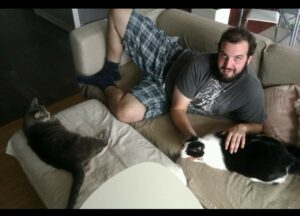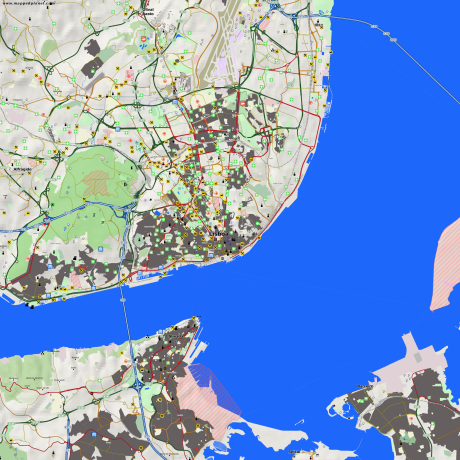Outcast, Downcast, and Miscast: My Evolving Sense Of “Home” By Adam Clarke
July 2022
Come Home Year 2022 is upon us and there is a drive to get Newfoundlanders to return to the Motherland, a journey promoted as both good for the exiled Newfoundlander’s soul and a counterweight to the rising costs and dwindling resources that have driven so many of us out of the province in the first place.
They say “you can’t go home again” and I’m really hoping they are wrong. If they are not, I just made the biggest mistake of my life because I have returned to my birthplace of St John’s after an eight-year absence. Though I’ve come back for the odd Christmas and wedding during that time, I haven’t called this province home for ages. In fact, I never truly considered Newfoundland as home at all until I thought I’d left it behind.
As a child in the 1980s and 1990s, Newfoundland wasn’t really a great place to grow up. At least, not for a boy like me. I felt a bit out of place here as a youngster. For one, my mother is Lebanese and my father British, so my accent is different. Like most Newfoundlanders, I could not get away from the way the dialect changes the way you hear and say certain words. I don’t care how muted your accent is, most of us can’t say “car” or “star” without that distinctly Newfoundland adenoidal honk that makes you sound indistinguishable from the Jiffy Cabs’ dispatcher.
Thus, as a kid, my accent (or lack thereof) got me in trouble. I’ve heard many a tale from fellow Newfoundlanders who feel understandably frustrated when they are undermined or spoken down to because having a strong accent brings out the classism in many (including, but not exclusive to, mainlanders). That’s not my story. I was relentlessly teased for “putting on airs” because I didn’t sound authentic enough. Clearly I was “off” or “mainlandery” in some way because I sounded more like Gordon Sinclair than Gordon Pinsent. It cuts both ways in this province. Your accent’s either too posh to be seen as authentic or too thick to be taken seriously.
Being othered at school because of the way I spoke was one thing, but there was isolation at home, too. I was a latchkey kid, which is to say I was raised by a VCR instead of parents. My mother was going to school and working full-time while my father expressed as little interest in my brother and I as possible. So, between the family’s frequent trips to video stores and my ability to access any book out of the nearby AC Hunter library, I combatted a sense of isolation with any bit of art or entertainment I could get my hands on.
It wasn’t long before any parental restrictions on media went out the window. I had an interest in old Hollywood, and every single horror movie I could get my hands on, from FW Murnau’s Nosferatu to then-recent hits like Pumpkinhead and Child’s Play 2. And I watched a lot of animation, ranging from NFB favourites like The Big Snit and The Log-Driver’s Waltz, as well as then-cultural zeitgeists like Ren & Stimpy, The Simpsons, and Beavis & Butt-Head.Naturally, I also devoured every bit of stand-up comedy aired on TV, regularly tuning into Canadian staples like CBC’s Comics! and CHCH’s Comedy At Club 54 before digging in deeper to the albums and specials of favourites like George Carlin and Norm Macdonald (to cite a few examples). I admired Carlin not just for his obvious intelligence, but for pulling off the extremely difficult balancing act of delivering incisive social commentary without descending into pious lecturing and abandoning the simple art of being funny (“Conservatives will do anything for the unborn, but once you’re born: you’re on your own”). Norm displayed a fearlessness in making a joke about any subject, mundane or taboo, without ever running the risk of having people put him on a pedestal like people often did with Carlin. Norm always played the rube while rattling off brilliant absurdities like “there are two subjects that make trouble in mixed groups: politics and my pet jackal.” The only other person I can think of who so successfully pulled off an act of obfuscating such an intimidating intelligence was TV’s Columbo.
I fell in love with all of this stuff that didn’t seem to exist where I lived. There was no comedy club in St John’s, nor the scrappy and lovable DIY stand-up scene that exists today. Movies occasionally got made here and CODCO was a hit TV series that proved that talent will out, but with no live stand-up, little sketch comedy, little-to-no genre movies, and not much animation, I felt adrift as a child and a teen.
I was ostracized for sounding different and not having the same interests as others my age while my brother adopted a traditional accent he maintains to this day. Since the rules for fitting in and getting along seemed foolish and arbitrary, I left in 2001. I travelled, studied acting (a passion I confess I was never terribly good at), and earned a degree in English and Theatre. I never intended to return, nonetheless I was back home in 2006 with the intent of saying a few quick hellos – and I spent seven years here instead and it was the most rewarding experience of my life.
Come on, you didn’t think I’d be ragging on Newfoundland for the whole article on nqonline.ca, did ya?
Suddenly, Newfoundland really did feel like home. It may not have registered as such in my early years, but being an adult in Newfoundland was really rewarding. Suddenly I loved to explore the province outside of St John’s, as opposed to the child me who pined to be visiting New York instead of Trinity. I was earning dribs and drabs of money with a variety of freelance jobs, editing, writing, and stand-up. Yes, somehow in my absence, a local stand-up scene had seeded and flourished. Better still, I was welcomed and felt perfectly at home amongst the burgeoning comedy community. Between stand-up gigs and what little acting work I could fetch as a deeply terrible character actor, I created a close-knit network of friends like I never had before.

It seemed like everything that had separated me from others – my interests, my voice – were now advantages. The wiseass comments that got me into trouble in the classroom were in demand at comedy shows. I made a decent living recording voiceovers for multiple corporate clients and I soon had a column writing about film and television in the late, lamented bi-weekly paper The Scope. I had everything I could possibly want, so I did the only thing a sane person could do: I threw it all away. I left Newfoundland for Ontario in 2013.
This didn’t come from a place of privilege. I didn’t leave, either in 2001 or 2013, because of any advantage. I left due to lack of fulltime work, absence of opportunity, and for my own safety. Despite my freelance successes and frequent promises of stable work or a permanent position, a career never materialized. I’d had a few plays produced and was enjoying some success with stand-up, but I didn’t know how to market myself as a writer or a comic, let alone network. Lastly, I left because I struggled constantly with depression and anxiety. Despite begging for help and fearing I might self-harm since 2011, the healthcare system could offer me nothing more than a position on a waitlist. I left reluctantly and even bitterly. Especially after I was forwarded a letter from the Health Science Centre stating that I would finally be able to see someone in the Psych Department … in 2014.
I managed to do some incredible things living in Ontario. Most crucially, I was able to access mental health supports with considerable ease. Next, I was thrilled to see stand-up comics who’ve never graced this province, such as Maria Bamford, Eddie Pepitone, and Emo Phillips. Similarly, I got to see musical acts that were unlikely to tour NL, namely film composers. If nothing else, this article can provide a home for a true statement that has nonetheless never been printed until now: I hurt myself dancing at a John Carpenter concert. The writer-director-composer upped the tempo on his moody scores for films like Escape From New York and Prince Of Darkness and added a welcome, blistering guitar to his music for The Fog and Ennio Morricone’s theme for Carpenter’s celebrated 1982 remake of The Thing.
I also saw premieres and revival screenings of so many horror movies.
Moreso, I made a big leap in my career and actually seemed to be on a good path. I went to college for TV production in Ontario. In my third and final year at school, I served an internship at a production company that led to me writing a pilot script that, while well-received by producers, ultimately didn’t go to series.
Despite these shining moments, I was miserable in Ontario. Unlike that wonderful period from 2006 to 2013 I spent in St John’s, I felt an absence of home for the first time. The levels of infighting, backbiting, and general toxicity of the stand-up communities throughout Ontario robbed me of any joy in performing and I quit. The ludicrous housing prices seemed to put every single person on a path where they kept moving to smaller and smaller communities in Ontario where they knew fewer and fewer people until they found something affordable. It was also hard to socialize because I wasn’t going to “find my people.” I had already found them in Newfoundland between 2006 and 2013. My entire time in Ontario felt like I was miscast in an ensemble TV show. That’s an awkward enough position for an actor, but it’s no way to live.
Most damningly of all, you just can’t talk to people about the Geoff Stirling legacy and late-night NTV weirdness. They think you’re doing a bit. Where’s the fun in that?
I’d been mulling over plans to come back since at least 2015 and I would frequently talk it over with friends I’d made in Ontario, friends I had back home, and friends from Newfoundland who’d made their home in Ontario. They all echoed the same sentiment: “come home out of it, b’y”.
February 28, 2022, was, to quote the tagline for John Carpenter’s Halloween, “the night HE came home” (he being me). Within days I found that I could return to stand-up and enjoy it again. Similarly, there was a great sense of comfort visiting the paths, landmarks, and trails I didn’t appreciate as a child. Most vitally, every single worthwhile friendship I made was intact, if not stronger than ever, despite my leaving many years ago.
It seems that home is an evolving concept and that the relationship we have with the places we were born and raised can also grow and change. I never would’ve believed you if you told eight-year-old me or even eighteen-year-old me that I’d come back here not just because I wanted to, but because I somehow needed to. That is exactly how I feel.
They say you can’t go home again, but I’m positive the naysayers and theysayers are wrong, whoever they are, and I hope they go to jail. Maybe they’re the same they who told me the average person eats eight spiders a year in their sleep, that the moon landing was fake, or that COVID-19 is an experiment in population control. I can’t say whether everyone should come home this year, but it was the right call for me. Finally, I can talk to people about Geoff Stirling and they have a common frame of reference, as nature intended.
Adam Clarke is a writer, comedian, video/audio editor, voiceover artist, (limited) actor, and (deeply limited) cartoonist. He once built a Robocop costume out of cardboard. That is not a childhood memory. That costume was built at the height of COVID in 2020.



